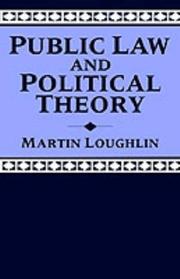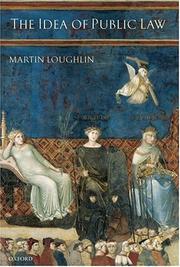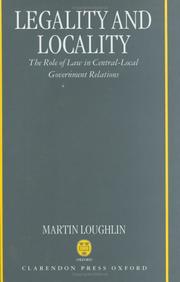| Listing 1 - 10 of 21 | << page >> |
Sort by
|

ISBN: 1901362523 1847316786 1472558944 1280801409 9786610801404 1847312578 9781847316783 9781901362527 9781472558947 9781280801402 9781847312570 Year: 2000 Publisher: Oxford Portland, Oregon Hart Publishing
Abstract | Keywords | Export | Availability | Bookmark
 Loading...
Loading...Choose an application
- Reference Manager
- EndNote
- RefWorks (Direct export to RefWorks)
This short and accessible book provides a provocative re-assessment of the various tangled relationships between law and politics and in so doing examines legal and political thinking on such critical areas as justice,the state, constitutionalism and rights. It introduces lawyers especially to certain important themes in some of the key texts in political thought and introduces political scientists to the legal dimensions of a number of central themes of political studies. Written by one of the leading theorists in constitutional law, the book should prove to be an indispensable companion for any student or teacher interested in law and politics. Contents I. Law and Politics in the Conversation of Mankind II. Justice III. The State IV. Constitutionalism V. Conclusions
Politics --- Law --- Droit et politique --- Law and politics --- Recht en politiek --- Law. --- Law, General & Comparative --- Law, Politics & Government --- Political aspects --- Political aspects.

ISBN: 0198762682 9780198762683 Year: 1992 Publisher: Oxford : Clarendon press,
Abstract | Keywords | Export | Availability | Bookmark
 Loading...
Loading...Choose an application
- Reference Manager
- EndNote
- RefWorks (Direct export to RefWorks)
Public law. Constitutional law --- Political philosophy. Social philosophy --- Public law. --- Political science. --- 321.01 --- 342.2 <41> --- Algemene staatsleer. Politieke filosofie. Staatsleer. Staatstheorie --- Staatsvormen--Verenigd Koninkrijk van Groot-Brittannië en Noord-Ierland --- 342.2 <41> Staatsvormen--Verenigd Koninkrijk van Groot-Brittannië en Noord-Ierland --- 321.01 Algemene staatsleer. Politieke filosofie. Staatsleer. Staatstheorie --- Political science --- Public law --- Law --- Administration --- Civil government --- Commonwealth, The --- Government --- Political theory --- Political thought --- Politics --- Science, Political --- Social sciences --- State, The

ISBN: 0199267235 9780199267231 9780199274727 Year: 2003 Publisher: Oxford: Oxford university press,
Abstract | Keywords | Export | Availability | Bookmark
 Loading...
Loading...Choose an application
- Reference Manager
- EndNote
- RefWorks (Direct export to RefWorks)
Public law. --- Public law --- Law --- Constitutional history --- History. --- Political aspects. --- Public law - England - History. --- Law - Political aspects. --- Constitutional history - England. --- Legal theory and methods. Philosophy of law --- Theory of the state

ISBN: 0198260156 Year: 1996 Publisher: Oxford : Clarendon,
Abstract | Keywords | Export | Availability | Bookmark
 Loading...
Loading...Choose an application
- Reference Manager
- EndNote
- RefWorks (Direct export to RefWorks)
Central-local government relations --- Local government --- Law and legislation --- -Local government --- -#SBIB:35H1354 --- #SBIB:35H6014 --- #SBIB:003.IO --- Local administration --- Township government --- Subnational governments --- Administrative and political divisions --- Decentralization in government --- Public administration --- Center-periphery government relations --- Local-central government relations --- Local government-central government relations --- Political science --- Federal government --- -Organisatie en beleid: lokale besturen: Verenigd Koninkrijk --- Bestuur en beleid: nationale en regionale studies: Verenigd Koninkrijk --- #SBIB:35H1354 --- Organisatie en beleid: lokale besturen: Verenigd Koninkrijk
Book
ISBN: 9780199669462 9780199256853 0199256853 1306130417 0191648175 0191594261 9780191594267 9780191648175 0199669465 Year: 2010 Publisher: Oxford, England : Oxford University Press,
Abstract | Keywords | Export | Availability | Bookmark
 Loading...
Loading...Choose an application
- Reference Manager
- EndNote
- RefWorks (Direct export to RefWorks)
This book develops Martin Loughlin's distinctive and provocative theory of public law, first outlined in The Idea of Public Law. Tracing the historical evolution of the concept of public law, the book rethinks the foundational concepts of state, constitution, and government, arguing that public power is created, not controlled, by law.
Public law --- State, The --- Rule of law --- History --- Philosophy --- Public law. --- Supremacy of law --- LAW --- Constitutional --- #SBIB:340H30 --- #SBIB:93H3 --- Administration --- Commonwealth, The --- Sovereignty --- Political science --- Administrative law --- Constitutional law --- Law --- Staats- en administratief recht --- Thematische geschiedenis --- Public law. Constitutional law --- Legal theory and methods. Philosophy of law --- State, The. --- Rule of law. --- History. --- Philosophy. --- Public law - History --- Public law - Philosophy
Book
ISBN: 0191682047 9780191682049 Year: 1996 Publisher: Oxford : Clarendon,
Abstract | Keywords | Export | Availability | Bookmark
 Loading...
Loading...Choose an application
- Reference Manager
- EndNote
- RefWorks (Direct export to RefWorks)
This work traces the main dimensions of the relationship between central and local government, concentrating upon the role played by law in shaping that relationship. It demonstrates how the issues raised are linked to the system of parliamentary democracy, and to the tradition of public law.
Central-local government relations --- Local government --- Law - Non-U.S. --- Law, Politics & Government --- Law - Great Britain --- Law and legislation --- Center-periphery government relations --- Local-central government relations --- Local government-central government relations --- Political science --- Decentralization in government --- Federal government
Book
ISBN: 0191708321 9780191708329 Year: 2004 Publisher: Oxford : Oxford University Press,
Abstract | Keywords | Export | Availability | Bookmark
 Loading...
Loading...Choose an application
- Reference Manager
- EndNote
- RefWorks (Direct export to RefWorks)
Loughlin argues that public law must be treated as a special indeed autonomous, subject and that the root cause of many of the difficulties and controversies that have arisen within both contemporary jurisprudence and also in the practice of public law have arisen because this argument has been neglected.
Public law --- Law, General & Comparative --- Law, Politics & Government --- Law
Book
ISBN: 0191847364 9780198810223 0192538381 019253839X Year: 2018 Publisher: Oxford : Oxford University Press,
Abstract | Keywords | Export | Availability | Bookmark
 Loading...
Loading...Choose an application
- Reference Manager
- EndNote
- RefWorks (Direct export to RefWorks)
A collection of brand new and revised essays from eminent scholar of public law, Martin Loughlin, that systematises his work on political jurisprudence - a school of thought that contends the key to understanding the nature of legal order lies in how political authority is constituted.
Jurisprudence. --- Law --- Philosophy
Book
ISBN: 9780674268029 0674268024 Year: 2022 Publisher: Cambridge, Massachusetts ; London : Harvard University Press,
Abstract | Keywords | Export | Availability | Bookmark
 Loading...
Loading...Choose an application
- Reference Manager
- EndNote
- RefWorks (Direct export to RefWorks)
Tracing constitutional thought from the Enlightenment to the present, Martin Loughlin shows how a tool for the protection of self-government has become a means for subverting popular will. Across the globe, constitutions now displace democratic decision-making, as courts interpret values in the law that ultimately trump legislative action.
Constitutional law --- Democracy --- 311.1 Grondwettelijke rechten en vrijheden --- 210 Politicologie --- 401 Administratief recht --- 101 Wetgevingstheorie --- Constitutional law. --- Democracy. --- Droit constitutionnel. --- Démocratie.
Book
ISBN: 0674276558 0674276566 Year: 2022 Publisher: Cambridge : Harvard University Press,
Abstract | Keywords | Export | Availability | Bookmark
 Loading...
Loading...Choose an application
- Reference Manager
- EndNote
- RefWorks (Direct export to RefWorks)
A critical analysis of the transformation of constitutionalism from an increasingly irrelevant theory of limited government into the most influential philosophy of governance in the world today. Constitutionalism is universally commended because it has never been precisely defined. Martin Loughlin argues that it is not some vague amalgam of liberal aspirations but a specific and deeply contentious governing philosophy. An Enlightenment idea that in the nineteenth century became America’s unique contribution to the philosophy of government, constitutionalism was by the mid-twentieth century widely regarded as an anachronism. Advocating separated powers and limited government, it was singularly unsuited to the political challenges of the times. But constitutionalism has since undergone a remarkable transformation, giving the Constitution an unprecedented role in society. Once treated as a practical instrument to regulate government, the Constitution has been raised to the status of civil religion, a symbolic representation of collective unity. Against Constitutionalism explains why this has happened and its far-reaching consequences. Spearheaded by a “rights revolution” that subjects governmental action to comprehensive review through abstract principles, judges acquire greatly enhanced power as oracles of the regime’s “invisible constitution.” Constitutionalism is refashioned as a theory maintaining that governmental authority rests not on collective will but on adherence to abstract standards of “public reason.” And across the world the variable practices of constitutional government have been reshaped by its precepts. Constitutionalism, Loughlin argues, now propagates the widespread belief that social progress is advanced not through politics, electoral majorities, and legislative action, but through innovative judicial interpretation. The rise of constitutionalism, commonly conflated with constitutional democracy, actually contributes to its degradation.
Constitutional law. --- Democracy. --- LAW / Public. --- Self-government --- Political science --- Equality --- Representative government and representation --- Republics --- Constitutional law --- Constitutional limitations --- Constitutionalism --- Constitutions --- Limitations, Constitutional --- Public law --- Administrative law --- Interpretation and construction --- Constituent Power. --- Germany. --- Global constitutionalism. --- Habermas. --- Hamilton. --- Hayek. --- Heller. --- India. --- Juristocracy. --- Liberalism. --- Madison. --- Montesquieu. --- Nationalism. --- Ordo-liberalism. --- Paine. --- Populism. --- Schmitt. --- The Federalist. --- The rule of law. --- Tocqueville. --- United States.
| Listing 1 - 10 of 21 | << page >> |
Sort by
|

 Search
Search Feedback
Feedback About UniCat
About UniCat  Help
Help News
News